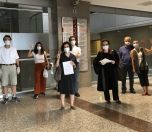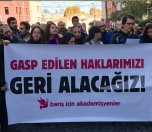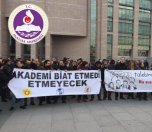Click to read the article in Turkish
The Constitutional Court shared its justified ruling on Academics for Peace signatory to the declaration entitled "We will not be a party to this crime" with a press release yesterday (July 30).
Announcing its ruling on 10 Academics for Peace who have been convicted of "propagandizing for a terrorist organization" for having signed the declaration on July 26, the Constitutional Court has ruled that the freedom of expression of academics has been violated.
In its press release, the Court has stated the following in brief:
'It doesn't mean that we support its statements'
"The Constitutional Court is aware of the concerns about statements and actions that would escalate the state of security in the region where, for the last 40 years, terrorist incidents that require declaration of state of emergency and claim the lives of people have been occuring.
"Moreover, the Constitutional Court is also aware that the declaration in question was prepared from a particular perspective and in a one-sided manner, contains exaggerated comments as well as hurting and aggressive remarks about the security forces.
"The comments indicating that the protection of freedom of expression as per the Article 26 is applicable to this declaration do not mean that the Constitutional Court shares the same opinions or supports these opinions.
'The statements that we do not support could fall within the scope of freedom of expression"
"The declaration that the applicants signed has a content that is really unacceptable for the great majority of the society.
"It is, of course, not possible to agree with a declaration that accuses the state, which has been struggling against terrorism, with "massacring", "slaughtering" and "torturing" people.
"Nevertheless, the statements that the Constitutional Court does in no way agrees with could fall within the scope of freedom of expression.
"In evaluating whether a remark or statement is within freedom of expression, whether this statement is true or disturbing is not determinant.
"The fact that an expressed opinion directs harsh criticisms against the authorities, uses a sharp accusing language and is even one-sided, contradictory and subjective does not mean that it leads people to violence or poses a danger to society, state and democratic order and, therefore, it also does not mean that it urges people to commit illegal acts.
'Boundaries of criticisms against the state are broader'
"There is no doubt that the boundaries of criticisms against the state are much broader than criticisms against persons.
"It is obvious that the opinions expressed in the declaration signed by the applicants are openly different than the ones held by the great majority of society. However, it is for that very reason that a sensitive attitude needs to be taken in terms of a judicial response to such statements.
"Considering all this information, it has been concluded that the conviction of the applicants does not meet an obligatory social need.
'Article 26 of Constitution has been violated'
"On the other side, the applicants have been given custodial sentences. Except for one applicant, their verdicts of conviction have been deferred and probation measures have been imposed on them.
"With the announced reasons, the Constitutional Court has concluded that the freedom of expression guaranteed by the Article 26 has been violated."
CLICK - Constitutional Court: Freedom of Expression of Academics for Peace Violated
(EKN/SD)








aaa.jpg)
